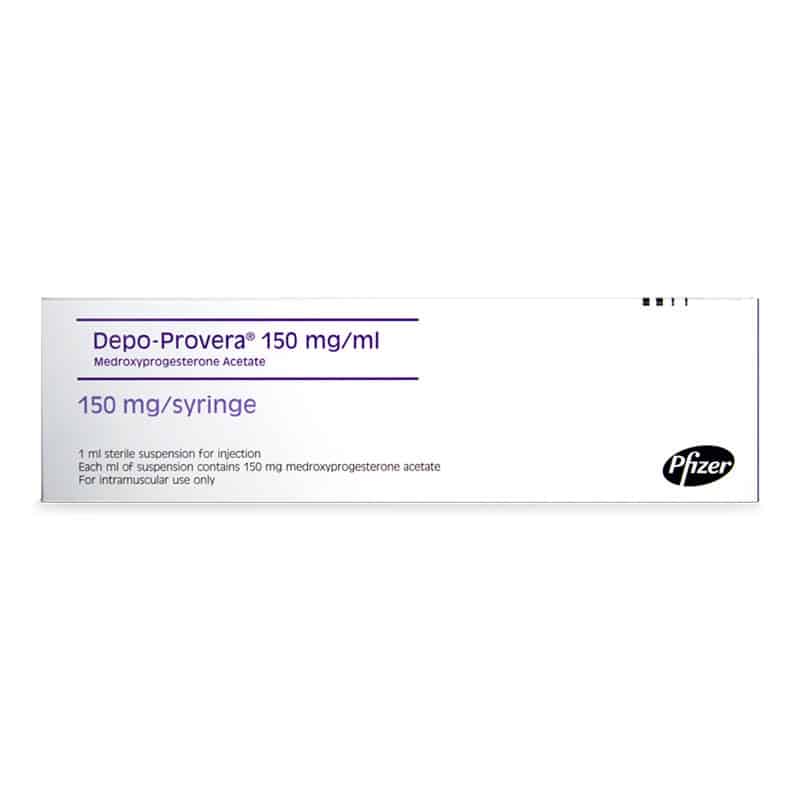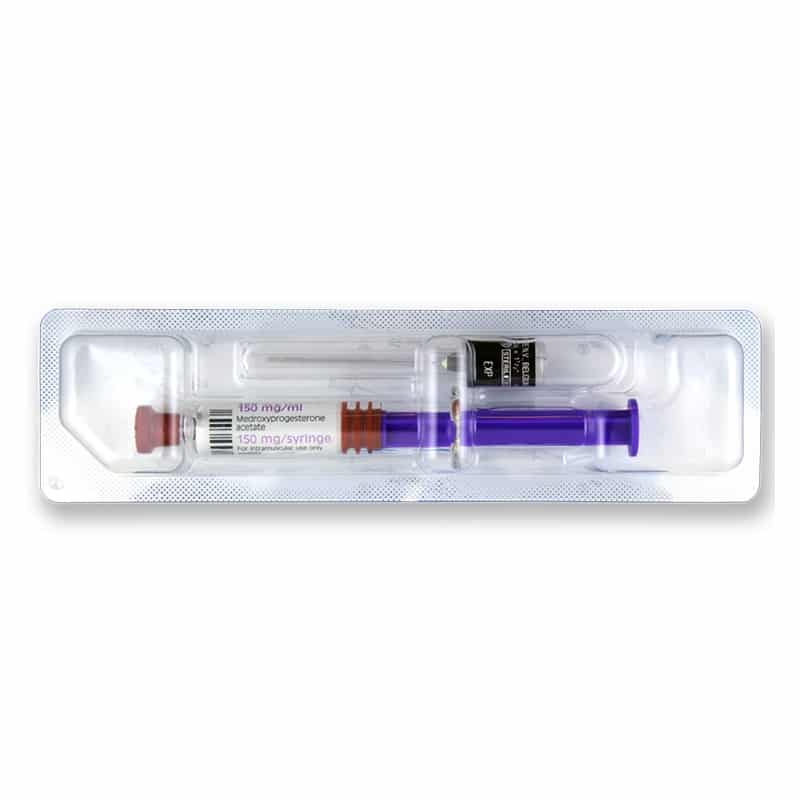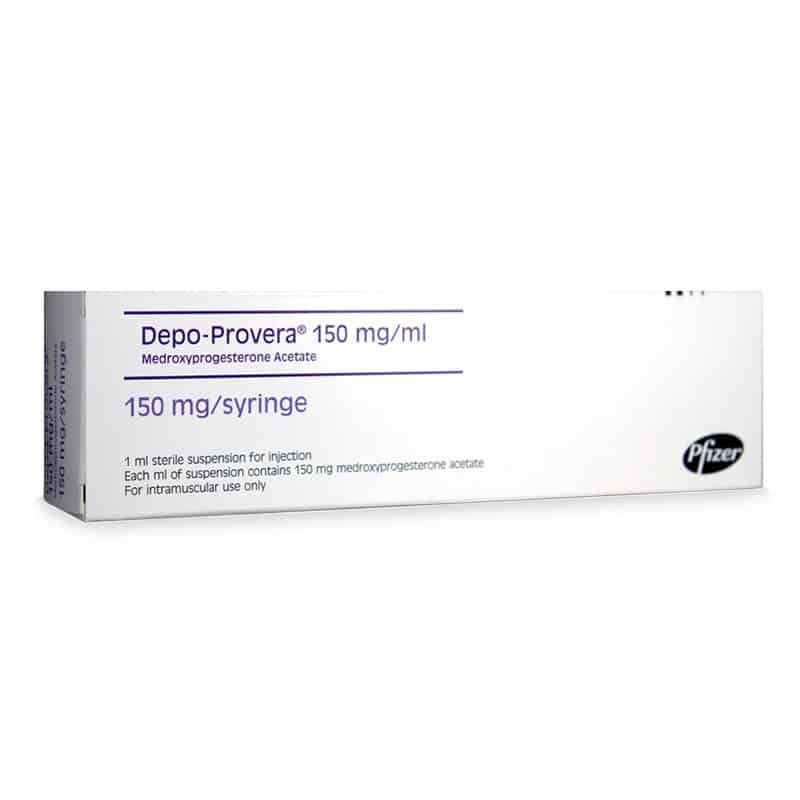DEPO-PROVERA® is an injectable form of medroxyprogesterone acetate, a synthetic hormone similar to progesterone. This medication is used primarily for contraception, but also for the management of certain cancers and endometriosis. Each injection provides three months of contraceptive protection, making it a convenient option for long-term use without daily or monthly administration.
DEPO-PROVERA® Indications for Use
DEPO-PROVERA® has several approved medical uses:
- Contraception: The primary use of DEPO-PROVERA® is as a long-term contraceptive. A single injection provides up to three months of effective birth control by inhibiting ovulation, thickening cervical mucus, and altering the uterine lining.
- Endometriosis: For women with endometriosis, DEPO-PROVERA® helps to control the painful growth of uterine-like tissue outside the uterus by reducing estrogen levels and limiting the growth of endometrial cells.
- Cancer: DEPO-PROVERA® is also used in the treatment of certain types of cancer, including breast cancer, kidney cancer, and endometrial cancer. In these cases, it works by inhibiting the growth of hormone-sensitive cancer cells.
DEPO-PROVERA® Dosage and Administration
DEPO-PROVERA® is administered by injection, typically into the muscle of the buttock or upper arm. The dosage and frequency vary depending on the condition being treated:
- Contraception: A dose of 150 mg is administered every 12 weeks for effective contraception.
- Endometriosis: The typical dosage is either 50 mg weekly or 100 mg every two weeks.
- Breast Cancer: The dosage for breast cancer is 500 mg daily for the first four weeks, followed by either 500 mg or 1000 mg weekly.
- Other Cancers: For other cancers, the initial dose is 600-1200 mg weekly, followed by 450-600 mg every 1 to 4 weeks.
It is essential that patients receive their injections on time to maintain the efficacy of the treatment, particularly in the case of contraception. If more than 14 weeks pass between injections, a pregnancy test may be required before administering the next dose.
DEPO-PROVERA® Side Effects and Precautions
Like all medications, DEPO-PROVERA® can cause side effects. Some are common and manageable, while others may be more severe and require immediate medical attention.
- Common Side Effects:
- Changes in menstrual bleeding patterns, including irregular bleeding, spotting, or the complete absence of periods.
- Weight gain and mood changes, including nervousness, depression, and fatigue.
- Headaches, dizziness, and acne.
- Back pain, joint pain, and leg cramps.
- Hair loss or increased hair growth.
- Severe Side Effects:
- Bone density loss: Prolonged use of DEPO-PROVERA® can lead to a reduction in calcium levels in the bones, increasing the risk of osteoporosis and bone fractures. This is particularly concerning in women under 18 years of age and those using the medication for more than two years.
- Blood clots: DEPO-PROVERA® may increase the risk of developing blood clots, particularly in individuals with a history of stroke, blood clots, or high blood pressure.
- Ectopic pregnancy: While rare, the risk of ectopic pregnancy (a pregnancy that occurs outside the uterus) increases if a woman becomes pregnant while using DEPO-PROVERA®.
Patients should report any sudden loss of vision, severe abdominal pain, chest pain, or difficulty breathing to a healthcare provider immediately, as these may be signs of serious complications.
DEPO-PROVERA® Drug Interactions
Certain medications can affect the efficacy of DEPO-PROVERA® or increase the risk of side effects. These include:
- Aminoglutethimide: This medication, used in the treatment of breast cancer, can reduce the effectiveness of DEPO-PROVERA®.
- Anticonvulsants and Rifampicin: These drugs may reduce the effectiveness of hormonal contraceptives like DEPO-PROVERA®.
Patients should inform their healthcare provider of any medications they are currently taking, including over-the-counter drugs and supplements, to avoid potential drug interactions.
DEPO-PROVERA® Clinical Studies and Real-World Outcomes
Clinical trials have demonstrated the efficacy of DEPO-PROVERA® as a contraceptive. It is 99.7% effective when administered every three months, making it one of the most reliable forms of birth control available. However, extended use can lead to a 1% failure rate, especially if injections are delayed beyond the recommended 12-week interval.
In addition to its use as a contraceptive, studies have shown that DEPO-PROVERA® can significantly reduce pain and the spread of endometrial tissue in women with endometriosis, with improvements typically seen after 6 months of treatment.
In cancer treatment, DEPO-PROVERA® has demonstrated effectiveness in slowing the growth of breast cancer, kidney cancer, and endometrial cancer, though it is not considered a cure for these conditions.
DEPO-PROVERA® Warnings and Precautions
DEPO-PROVERA® should not be used by individuals with the following conditions:
- A history of stroke, blood clots, or severe high blood pressure.
- Liver disease or unexplained vaginal bleeding.
- Known or suspected pregnancy.
Women who use DEPO-PROVERA® should also be aware that the medication does not protect against sexually transmitted infections (STIs), including HIV/AIDS. Safe sex practices, such as the use of condoms, should be followed to reduce the risk of STIs.




